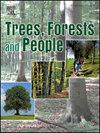The relevance of social-milieus for forest policy research – insights from a Germany-focused review
IF 2.9
Q1 FORESTRY
引用次数: 0
Abstract
This paper investigates the relevance and integration potential of social milieu approaches - particularly the Sinus Milieus framework - within forest policy research. Drawing on a literature review focused primarily on Germany, it synthesises insights from forest-related studies, as well as from other sectors such as environmental behaviour, transport, and media use. While traditional forest policy and private forest owner (PFO) studies have emphasised socio-demographic and structural variables, emerging evidence suggests that social milieus may offer improved explanatory power for forest-related attitudes and behaviours.
Results show that only a limited number of studies have applied social milieu typologies to forestry, relying mostly on quantitative methods, revealing differences between PFOs and the broader population in their affiliation with distinct social milieus. Evidence from other sectors underscores the potential of milieu approaches to enhance explanatory value. The review also highlights how such studies can inform the definition, operationalisation, and identification of milieus. However, differences in forest-related attitudes and behaviours among PFOs from different milieus, as well as the overall explanatory value of milieus, remain underexplored. Additionally, findings from non-milieu PFO research - covering social networks, values, identity, and personality traits - conceptually align with milieu-based frameworks and offer integration potential.
The paper identifies both methodological and empirical opportunities and challenges. Mixed-methods approaches and transdisciplinary formats, such as learning labs and focus groups, are needed to capture the complexity of forestry-distant milieus. Ultimately, social milieus offer a promising typological lens that can support more inclusive, differentiated, and effective forest policy development.
社会环境对森林政策研究的相关性——来自一项以德国为重点的审查的见解
本文探讨了社会环境方法在森林政策研究中的相关性和整合潜力,特别是窦性环境框架。根据主要以德国为重点的文献综述,它综合了与森林有关的研究以及环境行为、运输和媒体使用等其他部门的见解。虽然传统的森林政策和私人森林所有者(PFO)研究强调社会人口和结构变量,但新出现的证据表明,社会环境可能为与森林有关的态度和行为提供更好的解释力。结果表明,只有少数研究将社会环境类型学应用于林业,主要依赖于定量方法,揭示了PFOs与更广泛的人群在不同社会环境的隶属关系方面的差异。来自其他部门的证据强调了环境方法在提高解释价值方面的潜力。该综述还强调了这些研究如何能够为环境的定义、操作和识别提供信息。然而,来自不同环境的全氟磺酸之间与森林有关的态度和行为的差异,以及环境的总体解释价值,仍未得到充分探讨。此外,非环境PFO研究的结果——包括社会网络、价值观、身份和人格特征——在概念上与基于环境的框架一致,并提供了整合潜力。本文确定了方法论和实证的机遇和挑战。需要混合方法和跨学科形式,如学习实验室和焦点小组,以捕捉森林遥远环境的复杂性。最终,社会环境提供了一个有希望的类型学视角,可以支持更具包容性、差异化和有效性的森林政策制定。
本文章由计算机程序翻译,如有差异,请以英文原文为准。
求助全文
约1分钟内获得全文
求助全文
来源期刊

Trees, Forests and People
Economics, Econometrics and Finance-Economics, Econometrics and Finance (miscellaneous)
CiteScore
4.30
自引率
7.40%
发文量
172
审稿时长
56 days
 求助内容:
求助内容: 应助结果提醒方式:
应助结果提醒方式:


